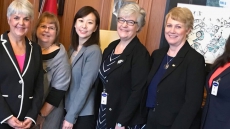VANCOUVER — For 10-year-old Isabelle Smit, finding new blood relatives through a long-shot DNA drive has been like a game of Connect the Dots.
Smit, who was adopted as an infant from Chongqing, China, and now lives in Esquimalt, B.C., describes a distant cousin she found in Holland.
"Her name is Yaya and she's the closest relative I've found. She's really tall, she's older than me. I think she likes Minecraft," Smit said.
"I don't know a lot about her, but she looks really, really cool."
Smit is one of 20 international adoptees from Chongqing who posted a video together to China's equivalent of Youtube, asking potential biological relatives to submit DNA samples.
The video gained thousands of hits after it was posted in December.
In the video, the adoptees introduce themselves, name the orphanage where they were adopted and where they live now. There are 19 girls and one boy ranging in age one to 16, who live in Canada, the U.S., the Netherlands and Belgium.
The video was picked up by Chinese media and the group's contact in China received a flurry of responses, Smit's mother Kristen Lundgren said.
From the initial 15 samples received from Chongqing, two American adoptees who weren't in the video found close matches. The results are entered into a larger DNA bank, so they aren't only tested against samples from the kids in the video.
In addition to Yaya, who was also featured in the video, Smit has matched with three other distant relatives, including one from Chongqing. But she's still holding out hope for her birth mother.
"We're hoping that maybe because these matches happened, it will get people talking," Lundgren said.
"Maybe more people will come forward who want to be tested."
An additional five samples that came in response to the video are still being processed. The group is working on more videos to keep it in China's public eye.
Lundgren said she was given very little information about Smit's birth family when she adopted her at 10 months old in 2007. But her guide told her most of the children were placed for adoption by families who couldn't afford the high fees of keeping a second child under China's one-child policy.
The one-child policy was phased out in 2015.
That year, almost 3,000 children out of 22,348 placed for adoption went to foreign families.
Lundgren's adoption agency emphasized the importance of birth family and culture for an adoptee, so Lundgren always wanted to help Smit connect with those parts of her identity, if her daughter expressed interest.
"I really strongly believe that the better you understand your own story, the better off you are. I have my own curiosity and I know I would want the best information possible," Lundgren said.
She said her daughter has written letters to her birth mother in China for as long as she's known how to write, but she's never had a place to send them.
"If she was really hesitant, I wouldn't do it. But she's always wanted that."
Lundgren said it's been a bit of a rollercoaster for her family, especially with no promise that the search will end with Smit's birth mom. But each time another family finds a match, it gives them hope.
"It's kind of incredible that 15 samples came back from China and [two] were matched with their birth families," Lundgren said.
"For a child, it's about understanding that it's a long-term process and our DNA is logged. And at some point, any point in the future, we could find someone who is a match."




